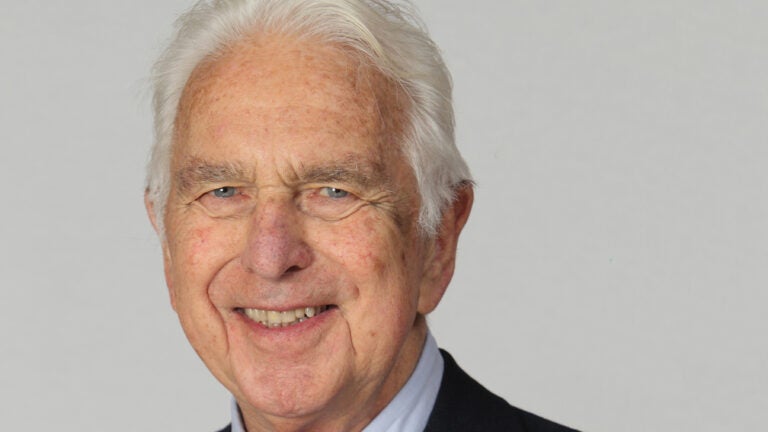
Warren Bennis (Photo/Philip Channing)
In memoriam: Warren Bennis, 89
The internationally recognized authority on leadership leaves a legacy of scholarship
Warren Bennis, University Professor and Distinguished Professor of Business Administration and an internationally recognized authority on leadership, died July 31 in Los Angeles. He was 89.
A lifetime of leadership
Bennis stood among the world’s leading experts on leadership. A prolific author, he wrote nearly 30 books on business administration, management theory and organizational leadership. On Becoming a Leader, one of Bennis’ bestselling works and a venerable classic in the field, was reprinted in 2009 and is widely considered to be a seminal text. The majority of his works were published during his 35-year tenure at USC, including An Invented Life, which earned him a Pulitzer Prize nomination. He served as an adviser to five U.S. presidents.
“Warren Bennis was a visionary whose transformational contributions to the business world have shaped the fundamental concepts of effective leadership,” said USC President C. L. Max Nikias. “Professor Bennis was one of a rare and esteemed group of pioneers, able not only to anticipate the demands of a changing world, but also guide the direction of this change through his exceptional scholarship, teaching and mentoring.”
Bennis joined the USC faculty in 1979 as professor of business administration, and during his tenure earned the rare distinction of being appointed both a Distinguished Professor and University Professor. He was the founding chairman of the USC Marshall’s Leadership Institute, which is dedicated to preparing future generations for the business and public sectors through real-world training. He also held the Joseph A. DeBell Chair in Business Administration from 1982 to 1997. He received USC’s highest honor, the Presidential Medallion, in 2001.
A human and humane business world
Bennis’ work was based on the notion that truly inspiring and powerful leadership lies in promoting openness and discussion, and allowing room for others to shine. Fundamentally, he believed in valuing people, and his contributions to creating a more human and humane business world are the cornerstone of his legacy.
Bennis was a tireless scholar, informed by a deep and abiding passion for his work. Credited as the progenitor of some of the foundational principles of organizational management, he constantly sought to expand the boundaries of his field. Most recently, he had been working closely with USC President Emeritus Steven B. Sample on a book about the important effects of experiences of failure on leadership. This latest pursuit was part of his larger project to understand the limits and blind spots that arise at the intersection of democratic organization and business administration. Sample and Bennis had co-taught a class for the past 14 years called “The Art and Adventure of Leadership.”
Enfolded within Bennis’ approach to teaching and scholarship was his ability to implement his ideas, and connect theory with application. This was epitomized by his observation that leadership cannot be taught, but it can be “caught.” As a leader, he taught by enactment and example. As an adviser to countless students, numerous colleagues, CEOs of major national and international corporations, he imparted wisdom by living out his leadership philosophy.
Dean James G. Ellis of the USC Marshall School of Business said: “Warren once told me that he believed each person contained ‘many selves,’ and that the key to a successful life was to draw out our best selves and our best talents. Rather than focusing on our shortcomings, he focused on our capacities as individuals. This belief guided his work, his relationships and his life, and is one of the main reasons that he so deeply affected everyone who had the privilege of knowing him.”
Born in New York City, Bennis grew up in Westwood, New Jersey. He served in World War II as an infantry officer and was awarded both a Purple Heart and a Bronze Star. He received his bachelor’s degree from Antioch College in 1951, and his Ph.D. from the Massachusetts Institute of Technology in 1955. It was in Cambridge, while serving as a faculty member, that Bennis and colleagues first began articulating what would become a groundbreaking set of theories on management. He served as provost of the State University of New York at Buffalo from 1967 to 1971, and as president of the University of Cincinnati from 1971 to 1978.
He is survived by his wife, Grace Gabe; his adult children Katherine, John and Will; and grandchildren Luke and Anya Movius, Devin Bennis, Daniel, Adam and Hanna Bennis; and stepdaughters Nina Freedman and Eden Steinberg; and step-grandchildren Nathan and Oliver Muz and Eliana and Abraham Freedman. The university will host a celebration of Bennis’ life on campus in early fall.



